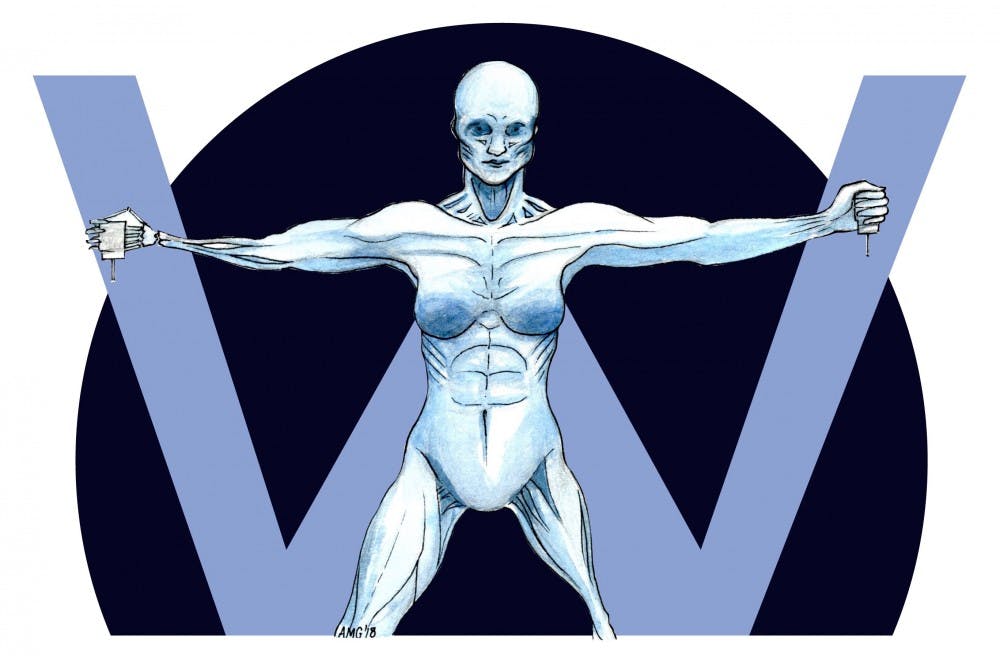After ending on a cliffhanger in December 2016, Westworld is finally returning to HBO for its highly anticipated second season on April 22nd. The part science–fiction epic, part western garnered attention during its first season due to its remarkable quality and thought–proving subject matter. To recap, Westworld season one followed several storylines, each involving or revolving around advanced humanoid robots called “hosts,” equipped with incredibly fine–tuned artificial intelligence. Within the confines of Westworld, a playground for the rich and powerful, the hosts can inflict no harm, whereas they themselves can be destroyed.
Between its complex narrative structure, top–notch performances, and a gripping thematic look at human consciousness, Westworld is a show not to be missed. In the year and a half since the season one finale, I have not hesitated to recommend the series to everyone and anyone—it has universal appeal.
Myself and other fans of the show have also had time to speculate about what’s next for the series. Due to the long–form episodes, Westworld’s first season had ample time for world–building, and to develop characters that will return in the second season—albeit in very different roles given the monumental events of the season one finale. Any predictions for season two are going to require some context from its predecessor, and so, naturally, there will be spoilers ahead.
As in season one, Westworld’s latest iteration will be set both inside the epic landscape of the theme park, as well as in the vast network of futuristic halls and glass–walled rooms of the corporate and development facility adjacent to the park. Except now, as was revealed at the end of the first season, programming changes have given hosts the freedom to attack the human beings that once puppeteered them. It is unlikely that season two will go easier on the HBO–brand violence and gore that was abundant in the first season.
It was speculated that the “war” between the hosts and human beings both alluded to at the end of season one and in trailers for the upcoming season would crowd out the series’ philosophical elements. However, by and large, this appears not to be the case. Westworld without its philosophical discourse just wouldn’t be itself. At the end of season one, not only were there major story arcs that remain open ended, but character arcs remained unfinished as well. As momentum mounted during the final few episodes of the first season, several main characters, particularly those who were hosts, had arrived at a kind of tipping point. The decisions they make early in season two, given the rapidly rising stakes, will likely set the course of the series as order turns to chaos.
It is evident from trailers that gorgeous production design, cinematography, and costuming will reinforce Westworld’s status as a show of virtually unmatched visual splendor. Meanwhile, one could only hope season two preserves the ambiguities and clever storytelling tricks that made the first season a feast for fan–theory enthusiasts. One of those theories was of the possible expansion of the story into other theme parks, which has since been confirmed. In addition to the vast open spaces of the American West, part of season two will set in ShogunWorld, a park modeled after feudal Japan.
Although it has not yet arrived on the air for audiences at home, Westworld’s second season has had a good start in terms of critical reception, standing at a 100% on Rotten Tomatoes. As a fan of its first season, my hope for Westworld is that its philosophical themes maintain their footing, while the pure entertainment elements of the show—its beauty and violence—are as striking as they were at the opening of the series. In any case, for many of us, it has been some time since we’ve revisited the television epic that is Westworld, given the year and a half long wait for season two. Unsurprisingly, our expectations are high, and we can only hope that season two can meet them with substance beyond dazzling visuals.

